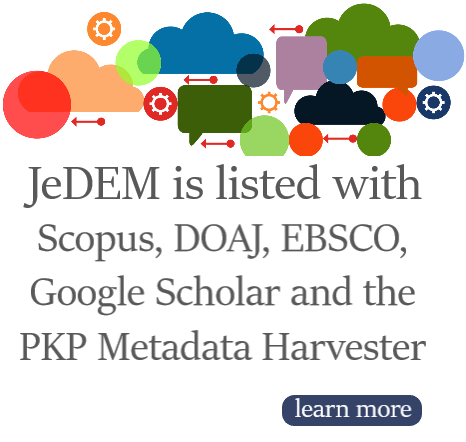Inquiring, Inventing and Integrating: Applying Human-Centered Design to the Challenges of Future Government
DOI:
https://doi.org/10.29379/jedem.v10i2.520Keywords:
human-centered design, digitalization, future government, public services, innovationAbstract
The challenges of future government involve opportunities for the conception, planning and delivery of new government services. Applying the principles and methods of human-centered design offers an alternative path for how we go about designing them. Inquiring into existing design practices allows for the discovery of new forms of design thinking and the application of new design methods and processes. A focus on human experience and human interaction promotes innovation and inventions, newly integrates public organizations and directly contributes to the creation of public value by benefitting the individual, government and society.
Downloads
Metrics
References
Avila, M. (2012). Devices. On Hospitality, Hostility and Design. HDK - School of Design and Crafts Faculty of Fine, Applied and Performing Arts, University of Gothenburg, Sweden.
Buchanan, R. (2015). ‘Worlds in the Making: Design, Management, and the Reform of Organizational Culture,’ she ji The Journal of Design, Economics, and Innovation Issue No.1, Autumn 2015: 5-21.
Dewey, J. (1927). The Public and its Problems. Ohio University Press.
Dewey, J. (1934). Art as Experience, New York, Minton, Balch and Company, New York.
Dorts. K. (2015). Frame Innovation. MIT Press.
Gonzales, R. (2018). ‘Your Poop is probably full of plastic,’ Wired online, https://www.wired.com/story/your-poop-is-probably-full-of-plastic/ [accessed December 2018].
Jönsson, L. (2014). Design events: On explorations of a non-anthropocentric framework in design. The Royal Danish Academy of Fine Arts, School of Design.
Junginger, S. (2015). ‘Design Legacies and Services Design’, The Design Journal, Vol 18(2), 209-226.
Junginger, S. (2017). Transforming Public Services by Design – Re-orienting Policies, Organizations and Services around People. Oxford: Routledge.
Malm, A. (2018). The Progress of This Storm: On Society and Nature in a Warming World. London: Verso.
March, J. G. (1991). ‘Exploration and Exploitation in Organizational Learning,’ Organization Science, Vol. 2, No. 1, Special Issue: Organizational Learning: Papers in Honor of (and by) James G. March (1991), pp. 71-87.
McKeon, R. (190). ‘Communication, Truth and Society’, Ethics, Vol. 67, No. 2 (Jan., 1957), pp. 89-99.
Nelson, G. (1979). Problems of Design, Watson-Guptill Publications; 4th edition.
Rein, M. and Schön, D. (1993). ’Reframing Policy Discourse’, in Fischer, F. and J. Forrester (eds.), The Ar-gumentative Turn in Policy Analysis and Planning, Duke University Press, 1993: 145-166.
Rein, M. and Schön, D. (1994). ‘Reframing: Controversy and Design’ in Policy Practice, New York: Basic Books.
Rittel, H. & Webber, M. (1973). ‘Dilemmas of General Theory of Planning’, Policy Sciences, 4: 155-169.
Roudavski, S. 2019, 'Notes on More-than-Human Architecture', in Undesign: Critical Practices at the Intersec-tion of Art and Design, eds. G. Coombs, A. McNamara & G. Sade, Routledge, Abingdon, GB, pp. 24-37.
Sandelin, E. (2018). Designer and Goldcrest. Malmö: Sorgenfri Press.
Simon, H.A. (1996). The Sciences of the Artificial. Cambridge, NJ: MIT Press, 3rd Edition.
Weisberg, Z. (2014). ‘The Trouble with Posthumanism: Bacteria are People, Too’, in Sorenson, J., ed. Critical Animal Studies. Thinking the Unthinkable. Toronto: Canadian Scholars’ Press, 93–116.
Williams, A. (2004). ‘Disciplining animals: Sentience, Production, and Critique’. The International journal of sociology and social policy, 24(9), pp. 45–57.
Downloads
Published
How to Cite
Issue
Section
License

JeDEM is a peer-reviewed, open-access journal (ISSN: 2075-9517). All journal content, except where otherwise noted, is licensed under the CC BY-NC 4.0 DEED Attribution-NonCommercial 4.0 International













